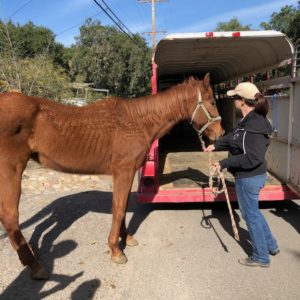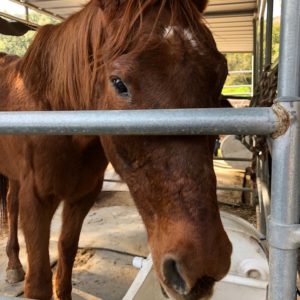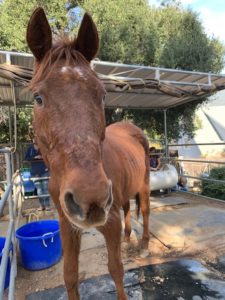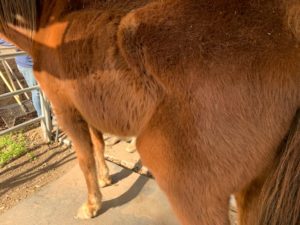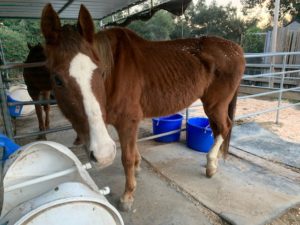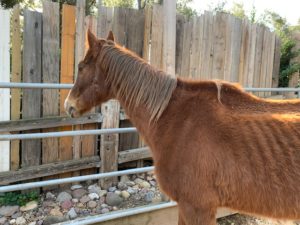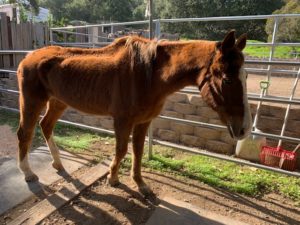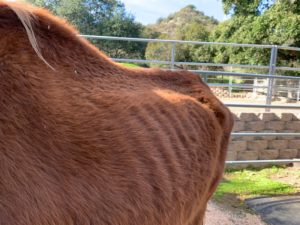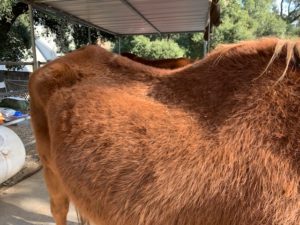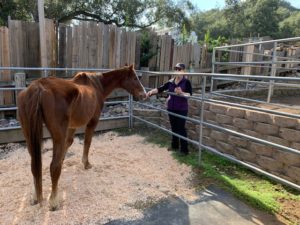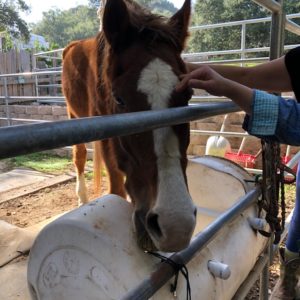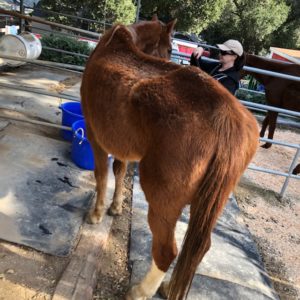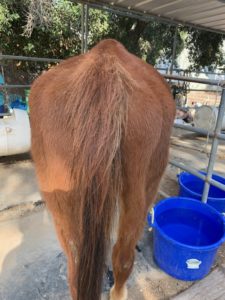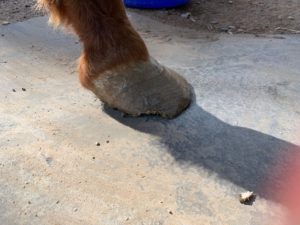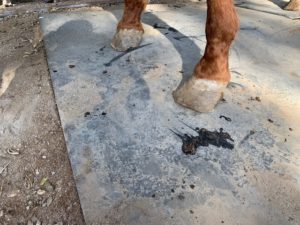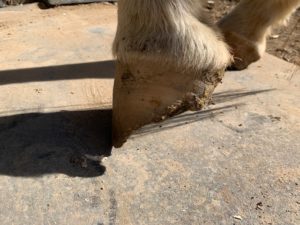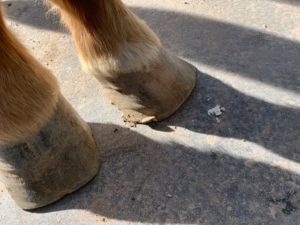A few days ago we posted about two horses who were starving in Temecula. Their owner had asked someone to shoot them, but a kind woman named Dawn intervened and said she would try to find someone who could save the horses. Unfortunately, we are full, but we were able to find a short-term foster home for these two horses and a trailer ride up to Trabuco Canyon, where Hanaeleh and the foster home are located.
The horses were scheduled to come Saturday morning. We received a few texts from Dawn- one saying that the two mares were actually a mare and a gelding! That was a surprise, but not a game changer. She texted a little while later saying that they would be a little late because they had been pulled over by the police for driving in the FastTrack lane, but they were able to pull into Trabuco Canyon around 12:30 on Saturday.
The horses came out of the trailer very slowly and clearly in a LOT of pain. The mare came first, and was limping very heavily, and it took a few minutes for the gelding to come out- he had a lot of difficulty backing up, so they finally turned him around and just let him hop out.
- Haven after getting out of the trailer.
From Elizabeth:
“The first thing that came to mind was that the horses were really worse off than I had hoped- given that I just had a small picture of them, I don’t know what I was expecting, but it’s always a shock to see animals in such a state of neglect. It wasn’t just the obvious starvation, but the hooves were so terribly overgrown and unbalanced, that it was difficult to tell exactly why the horses were in such pain.
“The horses looked around for several minutes as if they were in a daze. They didn’t seem to focus on anything in particular, and were probably a little overwhelmed by the trailer ride. They were so sweet, however, and even though they have been so mistreated by humans for so very long, they didn’t flick even an ear back- most of the time they had their ears forward, as if they were interested in what all of us women had to say.”
Luckily their stalls were right up off the street so we walked them the short distance and took off their halters- one halter had been on the gelding for so long that he had indentations from the halter on his head. We immediately gave each of them a scoop of alfalfa pellets soaked in water, and they began chowing down. From what we could gather, the previous owner had not been feeding them regularly for a very long time, and then for the last week that he owned them, he refused to feed them at all. They had been fed for the past few days while Dawn was trying to find them a safe place, but we were told that they didn’t even really eat much at first, as if they weren’t sure what to do with the food.
There is always a concern when horses are this thin that their body systems have begun to shut down, and there is a point of no return where they just cannot recover- they were probably within a day or two away from that point.
- Haven is very sweet and inquisitive
- Haven is very sweet and enjoy being lightly brushed.
- Haven’s hind end is sunken in from malnutrition.
- Cullen in his stall.
- Cullen
- You can see the marks from the halter on Cullen’s face.
- You can count every rip and vertebrae on Cullen
- Cullen’s back from the other side.
- Cullen says hi to Kathi
- Cullen enjoys the attention from all of the women
- Cullen from the back.
- Cullen from the hind. There is no fat at all and most of the muscle is completely gone.
Debbie, who is fostering the horses for us, asked if she could name the horses, so she named the mare Haven (as in, she now has a safe haven), and the gelding Cullen, which means “handsome” in Gaelic (we joked that Haven and Cullen sound a little like names from a gothic vampire novel).
Dawn and her friend who delivered the horses kept asking us if the vet would want to put the horses down- our answer is that we would see. We don’t want the horses to be in unnecessary pain, but if food, a little Equioxx and basic farrier care will keep them comfortable, why wouldn’t we try? These poor horses have been abused by humans for a very, very long time, and they deserve at least a chance at a decent life.
- The ridges indicate a lack of proper nutrition- look how far down the hoof the rings go- these horses haven’t been fed regularly in a very long time.
- Haven’s feet before- you can see how tall her hoof was on the right and how underslung the heels are on the left.
- Cullen’s hooves before- they also were too tall on the right and splayed out on the left.
Later that day, Elizabeth came back with a volunteer who is going to help Debbie with some of Haven and Cullen’s daily care, and gave the horses another small feeding and a loading dose of Equioxx to help them with their pain.
Both Haven and Cullen have a body condition score of “one.”
This is the lowest score a horse can have. They were probably a day or two away from dying from starvation. Their bodies are not going to be able to take in food normally, so they need to be fed small amounts multiple times throughout the day. It is very important that they do not get overfed, fed too rich of food, or fed too much at one time, as any of those tactics can kill them. They are just too thin right now for any vaccinations or for a teeth float, so our goal at this point is to help them slowly heal and gain some weight.
From Elizabeth:
“One of our volunteers, Leslie, is helping Debbie and her daughter with the horses, which is helpful as I and most of the volunteers have 14 other horses to work with! I took Leslie to meet the horses the night they came in. It was overwhelming for Leslie to see them in this condition, and she was very upset at first. What I tried to explain to her, however, is that it is important when in rescue that we do not allow the anger we have at the person who did this to these poor horses to overwhelm any of us. We cannot change what one awful person did.
What we CAN do is help these two gentle souls. Rescue by nature means that we often have to look at the worse humanity can do straight in the proverbial eyes, and somehow, instead of being caught up in that, we have to find a way to look past that ugliness that is, unfortunately, so much a part of humanity.
“People often say to us, “I don’t know how you do what you do,” or “I can’t do what you do.” The thing is, we all do this all of the time- we just may not experience this ugliness first-hand, but we’re aware of it. We know that people kill each other. We know that women are raped. We know that there is human trafficking. We know that there is domestic violence. We are aware of these things, and somehow, instead of being overwhelmed by them, we are able to continue to live our lives by carving out a place for ourselves that we fill with kindness and compassion.
Rescuers need to do the same thing. The difference is that we don’t just “know” these things, we see them first-hand. That is why it is so important that we do not allow that ugliness to cloud our souls, because then the ugliness overwhelms us, and then we are not any good to anyone. Instead of hating those who purposefully hurt these kind creatures, we have to instead focus our energies in determining how we can help them. We owe them that much, at least.”
We are very thankful for all of those people who have helped these two horses- from Dawn, to her friend who trailered the horses down, to Debbie and Leslie, and everyone else who has supported our efforts in rescuing Haven and Cullen. Thank you very much- we definitely cannot do any of this without that help.
Questions people have asked us:
Why do people allow horses to get into this condition?
Honestly, we don’t know. There is help out there if people ask for it. There are rescues like Hanaeleh that will network horses even if we can’t take them. There are equine coalitions that will offer hay free of charge for a short-term situation. There are even euthanasia clinics for horses who are in pain but their owners cannot afford the vet bill.
Why didn’t the owner take the horses to the auction?
The auctions are no longer allowed to sell horses in this body condition, as it extended the suffering of older and emaciated horses just so someone could get $25, instead of humanely euthanizing the horse.
Why didn’t you call animal control?
First of all, by the time we were called, the horses were no longer in the possession of the man who allowed them to get into this condition. Secondly, we had no idea where the horses were located (we just were told that they were in Temecula, a town about 40 miles south of Trabuco Canyon).
Why don’t you just euthanize the horses?
It’s important to have empathy for other living beings. If the vet tells us that the horses are in constant pain and there is no way we can alleviate their suffering, we will go that route. It seems ridiculous, however, to throw two lives away because of the actions of one sadistic person. If you were rescued from such a horrific place, wouldn’t you want a chance at living?
Will the horses make a full recovery?
Honestly, we don’t know. Our goal right now is to get them healthy and comfortable. We don’t know if the horses will ever be able to be ridden, but our goal is just to make sure the rest of their life they will always have plenty of food and love.
How much weight do they need?
We would guess at least 500-600 pounds each. Right now the horses are being fed 12 pounds of pellets- we will increase this as they begin to acclimate to being fed on a regular basis, and they will eventually be offered 30-40 pounds of food a day.
How long will it take for the horses to be completely healed?
It usually takes about a month to put 50 pounds of weight on a horse, so it will be close to a year before the horses will look completely normal again. It is not just weight, however, that must be put on- internal organs will need to be repaired by the body. Muscle will need to be built back up. The horses will need to grow new summer coats in a few months and the body will need to put resources towards that. Their hooves are terrible and have multiple ridges which show how very long they have been systematically starved- months if not more than a year. Rehabilitation sometimes takes a long time, but it is important that we don’t rush things as that can be detrimental.
What are the horses fed?
They horses are fed 12-15 pounds of soaked alfalfa pellets 4-5 times a day (3 pounds at each feeding). This will increase every few weeks, and we will eventually add in some orchard hay as well.
How long will they stay at their foster home?
They can stay at their foster home for a few months- we have someone who has offered to take them, but they are rather far away, and right now the horses are too fragile to make the trip. We are going to continue to look for options for them.
What do you need?
Food, primarily, and shavings. The horses are getting alfalfa pellets, so we would appreciate any donations of those, or money to go towards their food. The shavings just gives them something soft to lie on- since they don’t have any fat at all, and very little muscle, they are lying right on their bones, which is uncomfortable at best, and painful at worse.
In addition to food and shavings, in another month we will also need to start the horses on their vaccinations and get their teeth floated. We can only assume that it’s been years (if ever!) that they horses had their teeth floated.
Total donations needed for each horse: $1,025 ($2,050 total)
- One Bag of Alfalfa Pellets: $15
- One Bag of Shavings: $10
- Farrier: $40
- Vet Intake Exam: $70
- Teeth float: $250
- Vaccinations: $250
- First month’s food and supplements: $400
Ongoing care: $400/month (each horse)
Haven and Cullen will need extra feed to regain weight. They will go through about $50 worth of pellets a month plus $200 in hay EACH. Supplements, including a muscle mass supplement to help him gain weight, are an additional $150/month each.
How you can help!
There are two options to donate to help us care for Haven and Cullen:
1. Click HERE to donate any amount to help us care for Haven and Cullen.
2. Set up a monthly sponsorship for Haven and Cullen
We can only do this with your help. We’ll need monthly sponsors for Haven and Cullen due to what will surely be their long-term care. Choose from the options below to set up a monthly sponsorship for Haven and Cullen (be sure to let us know you are sponsoring them by putting their name in the space provided!).
Thank you for helping us rescue these sweet souls, Haven and Cullen!




